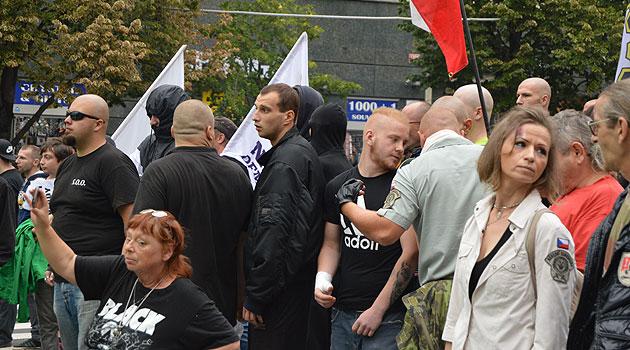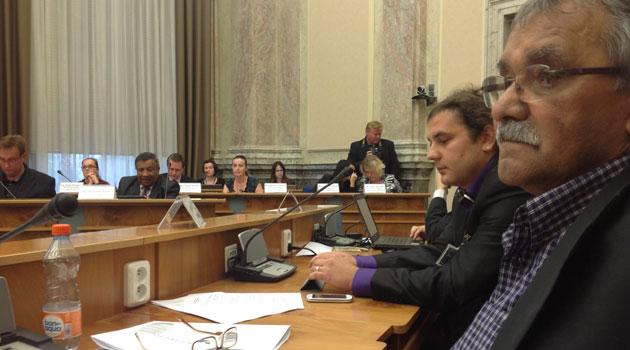Czech Culture Ministry's Subsidy Commission for National Minorities issues statement against growing intolerance

Earlier this month the representatives of national minorities who advise the Czech Culture Ministry on its Subsidy Commission for the Department of Audiovisual and Media Products issued a statement against growing national, religious and racial intolerance in Czech society. The national minority representatives expressed their concern and unease over the hateful attacks that more and more people have recently faced just because their ethnic origin, gender orientation or religious convictions are different from the mainstream.
The national minorities are calling on Czech politicians to “refrain from all speech that feeds xenophobic sentiment”. Jiří Ovčáček, spokesperson for the Czech President, responded to the statement on Twitter as follows: “Absolutely false claims about a hateful, xenophobic Czechia. Inflated, insulting statement that deepens the gulf.”
According to Georgi Bechev, a representative of the Bulgarian minority who initiated the declaration, it is the statement of the presidential spokesperson that is exceedingly arrogant and inflated. “The President of the Czech Republic, speaking through his spokesperson, discredits himself when, in opposition to his inaugural promise to be the President of all citizens of the Czech Republic, he refuses to hear the serious arguments being made,” he told news server Romea.cz.
Interview with Georgi Bechev, member of the Subsidy Commission at the Czech Culture Ministry
Q: What inspired you to issue a public statement about the rising xenophobic tendencies in Czech society? Had the need to issue such a statement been brewing for a longer time, or was this a reaction to a specific recent event?
A: Xenophobia in the Czech Republic, in my opinion, has been latently growing for some time, but in an absolutely open form it gained strength roughly around 2015. The text of our declaration is a response to the many swipes taken at national minorities that we have witnessed since then. I believe that this bigger number of xenophobic assaults is directly related to how public figures, including the highest constitutional officers, speak about minorities.
Q: Which statements do you specifically have in mind?
A: If the very highest constitutional officer, the President of the Czech Republic, Miloš Zeman, has no hesitation about standing side-by-side on a state holiday with the right-wing extremist Martin Konvička, a man who previously said that “Muslims will be ground into bone meal”, or when the Vice Prime Minister of the Government of the Czech Republic, Andrej Babiš, accuses all Vietnamese people across the board of not paying taxes, and if that same politician then declares that the concentration camp for Romani people at Lety by Písek was actually “just” a labor camp, that behavior creates fertile ground for the cancerous spread of xenophobia across all of society.
Q: Why, in your opinion, are these statements dangerous?
A: They de facto legitimize extremism. The engrained prejudices, which have been smoldering beneath the surface until now, will once again rise to the surface with full force. It is dangerous that this fear of the foreign, these prejudices, are presented by different politicians and various public figures as patriotic values. From that position it’s just a short step to everybody else behaving the same way they do. Today we are seeing the re-emergence of antisemitism, for example, whether in the form it took when the city councilor in Prostějov made his presentation about the issue of reclaiming a former Jewish cemetery, or the verbal assault made against a Jewish man in the Prague metro.
Q: Do you have personal experience with xenophobic assaults?
A: I myself, fortunately, do not, but I have encountered victims of such attacks more than once. The last impulse for the writing of our statement, for me, was the fact that my neighbor received an anonymous, threatening letter defaming Islam in January, by post – his parents are originally from Algeria and Germany. I personally know my neighbor, he has long lived in the Czech Republic, he works, he’s fully integrated, he’s active in the local community, he is raising three children, and despite that, he became the victim of verbal threats, probably just because his name doesn’t sound Czech.
Q: Why does such behavior only trouble some people in society?
A: One becomes most aware of the extent of the threat only when it touches one’s immediate surroundings. I myself am from a mixed Balkan-Czech environment, and my opinion is that I am a bit more sensitive to displays of xenophobia than the majority society. When I presented the text of the declaration to my colleages on the commission that assesses the program of “Support for Disseminating and Receiving Information in National Minority Languages”, I ascertained that they view this problem just as strongly as I do. We agreed, therefore, to publish the text as a statement beneath which 10 representatives of national minorities living on the territory of the Czech Republic would sign their names.
Q: What do you want to achieve with this statement?
A: The aim of the text is to point out the danger that is slowly gaining strength, and especially to give political representatives the resolve to behave responsibly. As is well-known, the term “xenophobia” comes from the Greek words “xenos” and “phobos“, and in translation it means “fear of the foreign” – not what is foreign and known to us, but especially what is foreign and unknown to us. Politicians are responsible for how the public discourse unfolds with respect to currently hot topics. They are the ones who should ameliorate this fear of the unknown in society, who should conduct themselves so as to raise awareness, not to feed the fear, as is currently, unfortunately, happening frequently.
Q: What form do you believe the xenophobic attacks have taken most often recenlty? Who, in your opinion, is involved most frequently in such assaults?
A: I would like to answer that question, but I don’t want to judge people or speculate without verified facts. That would mean I would be committing the same kind of generalization I am protesting. A meaningful answer to your question can probably be had from a psychological or sociological survey.
Q: What do you make of the remark made by Jiří Ovčáček, the press spokesperson for President Zeman, who called your statement, when he posted to his Facebook profile, “Absolutely false claims about a hateful, xenophobic Czechia. Inflated, insulting statement that deepens the gulf.”
A: I don’t know whether I should comment on it, I hope anybody here could form his or her own opinion about it. When I read his response, I recalled the saying that the “Goose who has been hit makes the most noise.” Moreover, it appears to me that if anybody has issued an exceedingly arrogant, inflated statement, it is the President’s spokesperson when, in an effort to create a provocation and a soundbite, he dismisses our legitimate opinion instead of reflecting on its essence. The President of the Czech Republic, speaking through his spokesperson, discredits himself when, in opposition to his inaugural promise to be the President of all citizens of the Czech Republic, he refuses to hear the serious arguments being made.
